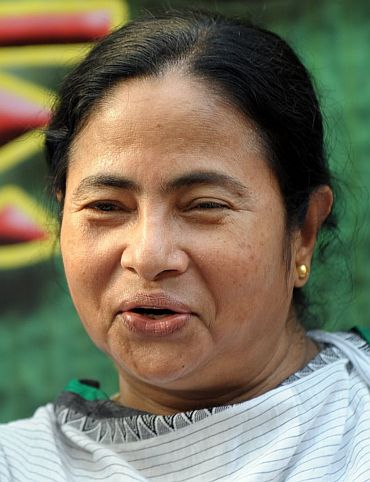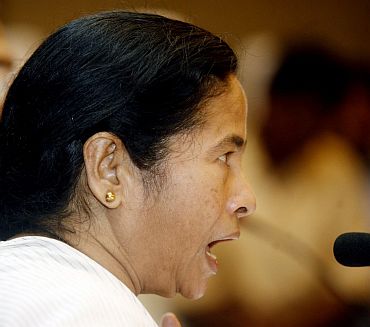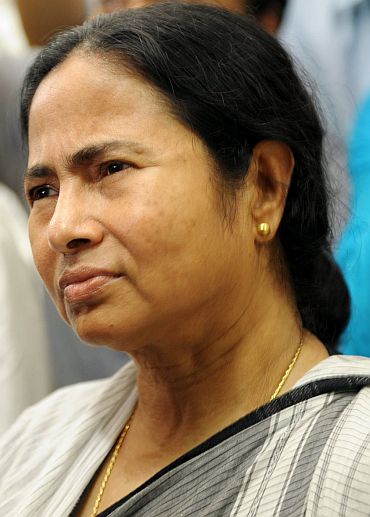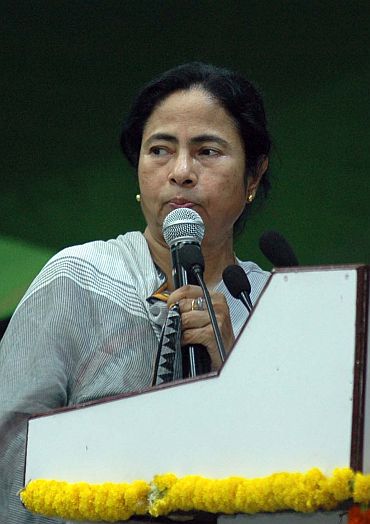 | « Back to article | Print this article |
Mamata delivers in first month in office
The Gorkha Jan Mukti Morcha put aside its demand for a separate state of Gorkhaland and agreed to a new hill council with more autonomy in a bipartite agreement signed with the West Bengal government, signalling an end of the 15-year-old movement in Darjeeling.
The chief minister, who had earlier stated that she would solve the Darjeeling problem within three months of coming to power, announced on June 7 that her 'magic formula' of development had led to the breakthrough.
The bipartite agreement, described as 'historic' by the chief minister, was signed by GJM General Secretary Roshan Giri and Home Secretary G D Gautama.
Click on NEXT to read further...
Mamata delivers in first month in office
Consensus was reached on the formation of a new hill council replacing the Darjeeling Gorkha Hill Council, which would have full administrative, financial and executive powers and be given more autonomy.
"We are satisfied with the talks and will cooperate with the government," Giri later said.
After concluding the Darjeeling chapter, it was the turn of the farmers of Singur who had unwilling parted with their land for the abandoned Tata Motors Nano project and also not accepted compensation cheques to wait for 'Didi' to fulfill her promise to them.
On June 14, fulfilling the election pledge of the chief minister, the West Bengal assembly passed The Singur Land Rehabilitation and Development Bill, 2011 scrapping the previous Left Front government's deal with Tata Motors.
Mamata delivers in first month in office
The bill vested the entire 997.17 acre of acquired land at Singur along with the existing structure with the state government. The government was to return equivalent quantum of land to unwilling farmers.
The remaining portion of the land was to be utilised for socio-economic development, employment generation, industry and other public purpose.
The passage of the bill, which was adopted by voice vote, amidst a walkout by members of the Left, was not without its pinpricks with the Opposition dubbing it as flawed and that it could be a trigger for court cases.
Tata Motors, on its part said, it had moved out of Singur reluctantly and would take "appropriate steps" after studying the Bill.
The company said the Bill's purpose was taking away of the land because of 'non-commissioning' and 'abandoning' of the project, but pointed out that construction of the plant was done under difficult conditions amidst violence, disruption of activities and threats to personnel.
The chief minister, however, expressed satisfaction saying, "What we have done in these few days has never been done before nor will anyone be able to achieve ever after."
Mamata delivers in first month in office
Besides achieving the two milestones, Banerjee focussed her attention on changing the work culture with an appeal to government employees to forget political affiliations and the past and work together.
Banerjee visited a number of government-run hospitals and institutes when least expected and suspended the director of one of the institutes.
The main challenge facing the chief minister is the financial crisis thrust on her by the earlier government for which she has sought central assistance.
Economist Sugata Marjit said, "Mamata's sudden visits to government-run hospitals, the power, food and police departments have given a major jerk to the lethargic system that developed over the last 34 years of Left Front rule."
Another economist Aviroop Sarkar said, "The Left did not allow competition and decisions were taken at the party office. We need fair policies and the will to revive industrialisation in Bengal."
Banerjee also had an interaction with industrialists where she announced that land would have to be purchased directly by the investors besides the formation of a core group to sort out problems and work out plans for investment.
Industrialist Harsh Neotia said, "That was a positive meeting. I hope the core group which has been set up will help resolve issues raised by industry and potential investors."



